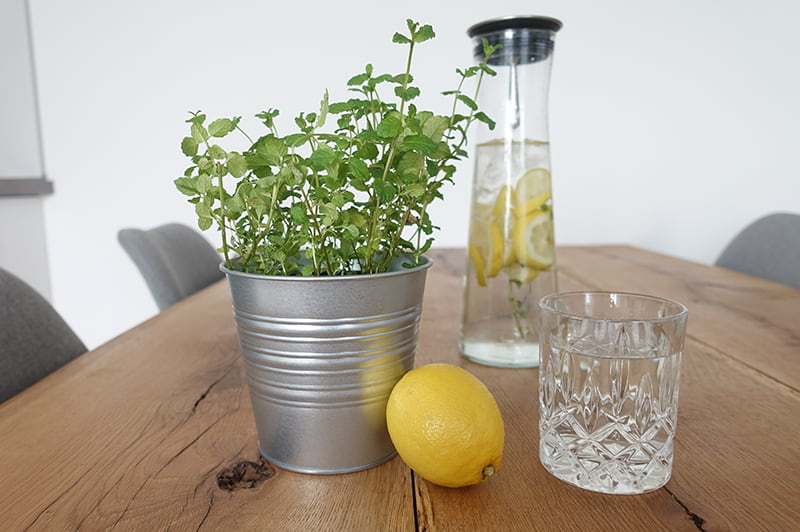What is actually meant by frugalism? More and more people are deciding to live a frugal, conscious lifestyle as quickly as possible. Financially independent and call themselves frugalists. But what exactly is behind the movement and what are the links to sustainability? That's what we need to find out.
In this article, I would like to introduce you to the Frugalist lifestyle. From the definition, to principles, to tips for a more frugal everyday life.
Notice: Since frugalism is very critical of consumption and has many points of connection to sustainability, I think the basic principle fits very well with CareElite. Not everything, but a lot!
What is Frugalism?

The term Frugalism stands for a simple, modest and conscious way of life. Frugalists pursue the long-term goal of not so to have to work long hours for their own income until they are 67 years old.
All in all, frugalism means: Spend less and save more, so that one is not held captive by social constraints and instead Achieve financial independence can.
Notice: I would say that I have been unconsciously like a frugalist all my life. Not a penny pincher, but someone who simply handles money consciously. Since we live in an extreme consumer society, this "unusual abstinence" has only formed its own term, which is thought on.
Principles for frugal living
The various principles of frugalism provide more clarity. In my opinion, these include both sometimes more and sometimes less defined rules and decisive attitudinal characteristics.
Recommended rules
- Do not buy something you want directly. Question a few days and if you see the need, buy. (3 days rule)
- Among frugalists, it is said that you can freely withdraw and spend about 4% of your savings without compromising your long-term goal of financial independence. (4% rule)
- Awareness that there are alternatives to the state pension.
- Conscious goal of becoming financially independent through own behavior.
- Only own what you really need in everyday life.
- Spend money only on the things that help you personally.
- Focus on the goal of financial independence without getting distracted.
- Most of the money should be kept - and the rest should be invested in experiences.
- Awareness that money can be saved basically everywhere.
- Long-term and diversified investment of savings.
Notice: There is also the 752 or 173 rule among frugalists. You have to multiply your recurring weekly expenses by 752 and your recurring monthly expenses by 173. The result is the amount of money you would have after 10 years if you had saved the money. A lot of subjunctive in my opinion, but certainly an additional motivation for one or the other.
Setting & Features
Frugalists change their habits and do without many things that are usually superfluous. Here are a few basic attitudes and characteristics for you to better classify frugalism. Frugalists...
- reduce their spending and live frugally.
- buy many things cheaply used rather than new.
- save up to 70 percent of their income.
- live as cheaply as possible.
- buy low-priced food as consciously as possible.
- invest their savings to live off the interest.
- do not make degenerate parties, extensive shopping trips or expensive vacations.
- abstain from stimulants and addictive substances such as alcohol or cigarettes.
- don't need a car, don't have expensive furniture, and don't have the latest technology - they have only the bare necessities.
- …
Question: Can you think of any other characteristics of frugalists? Then feel free to write your ideas in the comments.
Pros and cons of frugalism
You should weigh both the advantages and opportunities, as well as the disadvantages and criticisms on the subject of frugalism to form a clear opinion about it. The lifestyle is not suitable for everyone, so I would like to give you the corresponding advantages and disadvantages here.
Advantages & Opportunities
- More conscious consumption: In times of mass consumption, when one Black Friday follows the next, you only buy the things that really get you ahead. That saves you time and money.
- Cost management: As a Frugalist, you learn to reduce and prevent big spending. You also learn to be more conscious with money.
- Adjust savings rate without stress: For example, if one's income increases, one can increase the savings rate. If you give a sustainable study you can lower them a little.
- Investing money is learned: To increase the money faster, you learn to invest it wisely and profitably.
Disadvantages, criticisms and counterarguments
- Easy for top earners: It is often argued that frugalism is only possible for top earners. With a high salary, you can of course set up high savings rates. But basically everyone who has a sufficient monthly income can save something. Some more, others less.
- Extreme economy: Depending on their own possibilities, frugalists live very very frugally and do without a lot. For some, this may feel like a step backwards. Basically, the Lifestyle but simply very minimalist.
- Tends to be more suitable for city people: Doing without the car, the fuel costs and the repairs is much harder to implement in the countryside.
- Necessary savings amount difficult to predict: The amount you need to have on hand is difficult to define. Especially since there are certain variable risks at any time, such as inflation or possible stock market crashes.
What does frugalism have to do with sustainability?
Frugalists are all about money. So what does the movement have to do with sustainability anyway? Here are a few reasons why I'm writing about it here at CareElite:
- Consumer critique: Frugalism means critically questioning one's own consumption, as is also the case, for example, with the Zero Waste Lifestyle is the case. Although the focus here is increasingly on aspects such as necessity and cost, the purchase of products is also questioned.
- Adapt own behavior: Whether sustainable or frugal - both lifestyles encourage people to use resources more consciously and to change their habits. For example, if you save energy costs by putting the lid on the pot when boiling water, you combine both lifestyles in an ideal way.
- Use reusable things: Frugalists also take care not to consume disposable products, because constantly buying new ones is very expensive in the long run. So there are overlaps there, too - for example with the plastic free life.
- Money aspect: "A sustainable lifestyle is too expensive," you hear so often. But basically, sustainable living is also very economical if you only buy the things that are absolutely necessary. In the article about save money through sustainability you will learn much more about it.
Critically to regard is with the Frugalismus the point, starting from which one aligns the focus exclusively on financial aspects. Regular cheap flights on vacation or the purchase of cheap meat from Factory farming I count, for example, among them.
Tip: So, in order for frugal living to remain conscious and sustainable in the long run, one should not be too frantically tempted by the financial aspects.
Frugalism Money Saving Tips

Whether you call this paragraph Frugalism Tips or Money Saving Tips - it's all the same. In the end, it's all about saving as much money as possible in the home while protecting the environment. Here are some tips that frugalists also take to heart.
Notice: If you think of any other ideas for the points, feel free to comment again.
Consumption
- Used instead of buying new: Everyone knows portals such as eBay Classifieds. There you can really buy everything used and therefore cheaper. This saves resources and your wallet.
- Borrowing things: Frugalists, for example, borrow books instead of buying them over and over again. City libraries usually have the latest equipment, and you can also place your own special orders if necessary.
- Repair instead of throwing away: In the spirit of frugalism and sustainability, you should not throw away shoes with broken soles. Rather, repair them yourself, or have the cobbler do it.
- Sell unused things: Your money will accumulate if you just sell all the unnecessary things from your closets. This, in turn, also benefits the environment and the wallets of others.
- Make free phone calls: Why pay so much money for an expensive cell phone contract when you can make free calls?it's cheaper over the Internet with Skype and WhatsApp. See also the article Sustainable telephony.
Living & Everyday Life
In frugalism, people try to live as cheaply as possible to keep their expenses minimal. A few ideas about this as well:
- Tiny House: Rent is becoming more and more expensive in big cities. Building a house is not cheap either. A minimalist tiny house can therefore be an alternative.
- Make furniture yourself: I love to make my own furniture from dusted wooden planks. It's fun and easy on the wallet. Look with pleasure in my DIY Furniture Blog over.
- Sustainable gardening: Exactly! You can also make a Garden sustainable design and save money in the process. For example, by collecting rainwater and watering your plants with it. Or you can make your own fertilizer with a worm bin.
- Do without a car: If you have the possibility, then do without the car. I know that is not always possible. But maybe in the contribution Live car free some suitable tips for you.
Household
Also for the household the Frugalismus movement has naturally many Tipps for saving money. Here are some examples as well:
- Keep a budget book: That way, you know exactly how much you're spending and where there's still potential for savings. There are also cool, free apps that help you keep track!
- Saving energy in the home: Energy costs put pressure on your savings rate. For example, by putting the lid on the pot when cooking or not putting hot food directly in the refrigerator, you can save Save energy and money.
- Reduce water consumption: Yes, high water consumption also costs money. Showering instead of bathing and using the toilet more consciously saves a lot of water, for example.
- Make dishwashing liquid yourself: Frugalists save themselves a lot of money by doing things like. Making washing up liquid from ivy yourself. Ivy leaves are a dime a dozen - and free of charge.
- Cut rinse tabs in half: Another really cool tip is to cut dishwasher tabs in half. Plates, glasses and cutlery are just as clean as usual - only your wallet is fuller in the end.
Tip: Also a regular cold shower saves a lot of energy costs and makes you really fit for the day!
Food
When it comes to food, you also have countless ways to save money. Here are a few examples:
- Save food: With Food Sharing you can get free food from participating businesses and save it from the garbage can. More at Reduce food waste.
- Meal planning: By planning your food ahead for the week, you'll only have to buy what you need. Spontaneous purchases will be avoided and you will also get away less.
- Cook for yourself and more: The be-all and end-all of frugalism is cooking on your own and avoiding convenience foods. It's healthier and saves money. You can also always cook a little more, so that you still have some the next day or it freeze plastic free simply by following your heart.
- Tap water: We have the privilege to drink the water from the tap. It is up to 250 times cheaper than mineral water and you save the hauling. More under Tap water VS water from plastic bottles.
- Do away with coffee capsules and CoffeeToGo: According to Heldenmarkt, one kilogram of coffee costs the equivalent of 70 euros through the capsules - and leaves behind 8,000 tons of waste per year. CoffeeToGo cups are also not sustainable. So give up coffee or use a reusable coffee mug and bean-to-cup coffee. (more info at Nestlé criticism)
Clothing
Frugalists avoid regular shopping trips for the fun of it. After all, they cost a lot of money and overfill the closet. In the sense of Slow Fashion there are also some tips for this:
- Capsule Wardrobe: What sounds pretty fancy is just a few pieces of clothing that can be combined really well. So you spend less and still have many outfits at the start.
- Second Hand: I am glad that second hand fashion is fashionable again. It saves natural resources and your wallet.
- Have clothes mended: You can also repair clothes rather than buying them new all the time. By the way, this is one of many Lifehacks of our grandparents.
- Sell unused clothing: Think like a frugalist and get rid of unwanted or unused clothes. You can sell them on Kleiderkreisel or eBay Kleinanzeigen to those who would like to wear them.
Tip: Fast Fashion is basically the opposite of this conscious use of clothing - and accelerates many of the environmental problems of our time.
Finance & Investment
You can make even more out of the money you save. Here are some examples that Frugalists follow:
- Set aside money: It's the beginning of the month and your money is coming in? Then automatically set aside a certain amount of savings each month through a standing order. This will not tempt you to spend too much money.
- Passive investing: If the savings are just sitting in your account, they are not working for you, but rather against you. For example, invest it in sustainable ETFs and savings plans in sustainable companies.
Books about frugal life
Of course, there are already some exciting books that will certainly make the basic idea of frugalism even clearer to you. I can recommend these books to you appropriately:
- Retirement at 40*: Financial Freedom and Happiness through Frugalism, by Florian Wagner and Oliver Noelting.
- Frugalism - More than just minimalism*: The ideal book for beginners, intermediates, and those interested in getting more out of their money, time, and life by Sofia Hamann.
- More money for more life*: How to Change Your Relationship to Finance in Nine Steps - and Retire Earlier, by Vicki Robin and Joe Dominguez.
Frugalism calculator
With a tool specially designed for thrifty people, it is possible to calculate the approximate time at which one could retire.
Frugalism calculators should be used with caution, however, as they are programmed in a very simplified way and usually do not take into account blatant cuts in life and financial bottlenecks. With this computer However, you can easily get a rough idea of when you will be able to retire financially independently if you are careful.
Notice: To be honest, I have to say once again that the "money focus" of frugalism bothers me a bit. It can give the impression that it is exclusively about becoming as rich as possible. But that is not the most important thing in life. For me, it is even more important to be aware of what you spend your money on. Because a frugalist only spends money on things that are really necessary and avoids superfluous things. In this way, he saves money for the future. That's a very frugal, but above all also very resource-conserving and sustainable attitude.
Frugalism - A sustainable lifestyle with a clear goal!
Basically, everyone is a Frugalist who pursues the goal of being able to live his life freely and in a more self-determined way. Whether you then call yourself a Frugalist or not is up to you. But it is nice that we have found a term for it. I am therefore also of the opinion that basically everyone can be a Frugalist, the prerequisites of each individual are only different at certain times. In the end, a healthy mix of frugal and sustainable lifestyles is certainly a good combination for your wallet and our environment.
Do you have questions, tips, or your own experiences with frugalism that you'd like to share? Then feel free to write a comment below this article.
Stay sustainable,

PS.: Take a look at the DIY blog from CareElite around. There you can find inspiration for further savings tips and for example Make your own bread chips from stale bread. Have fun!






This is a super exciting topic - freedom and happiness - in a doable period!!!
This text is teeming with typos! But what is most disturbing about your website is the advertising! You keep talking about environment, no plastic etc. The advertising is the opposite! So, you get money for environmentally unfriendly advertising, but want to improve the world environmentally friendly! This does not go together. Make up your mind!
Environment or frugulism! because, in my opinion, you also want to stop working as soon as possible!?!
Moin Hendrik! Danke für deinen Hinweis zu den Fehlern im Text – daran merkst du schon selbst, dass die Arbeit an meinem Projekt Zeit und Geld kostet 😉
The advertising that appears in the banners here is usually based on your own surfing behavior. If products are displayed to you, then you have probably also consumed a bit, like every other person. CareElite is hard to finance without advertising, I hope you understand that.
I want to work all my life - I just want to do exactly what I burn for. And I'm already doing that. In this post, I just want to introduce the new trend of frugalism and similarities with sustainable living. In my opinion, no one has to choose anything. I live sustainably and try to live more frugally as a result. In any case, there are many similarities between the two lifestyles.
I hope that I could help you with this answer.
Best regards
Christoph
Comments are closed.